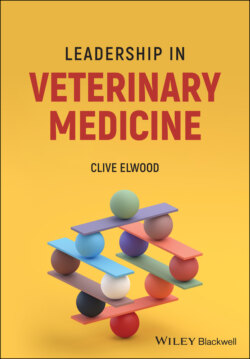Читать книгу Leadership in Veterinary Medicine - Clive Elwood - Страница 40
2.13 Conclusion
ОглавлениеThe veterinary professions have developed to serve the (often‐conflicting) needs of animals and human society. The right of veterinary professionals to practise is enshrined in law, and this contains and protects society from the conscious and unconscious anxieties arising from their relationship with animals. The landscape of this relationship is constantly changing, and, at different times, different societal needs dominate, e.g. from the basic needs of food supply to security and safety on to the need for love and companionship, even though the essential paradoxes of human–animal interaction may remain. In modern Western society, dominant anxieties include ageing, pain, death, and loneliness, and it is in this context that a changing relationship with our animal companions and an increasing emphasis on palliation and geriatric medicine might be considered inevitable.
The veterinary professions exist in a complex open system that cannot be simplified. Accepting the consequences of this and respecting the fact that each of us will have our own construction of our role and identity, which helps us negotiate the inevitable paradoxes, might reduce the righteous indignation that abounds when we find we cannot gain consensus on the difficult issues of our time.
As societal needs change, so the veterinary professions must adapt. There is increasing recognition that leadership is an essential professional skill and that, across the professions, we will always need accomplished leadership that reads and anticipates the need for change and that take us into the future with our selves intact so we can continue to serve those in our care.
